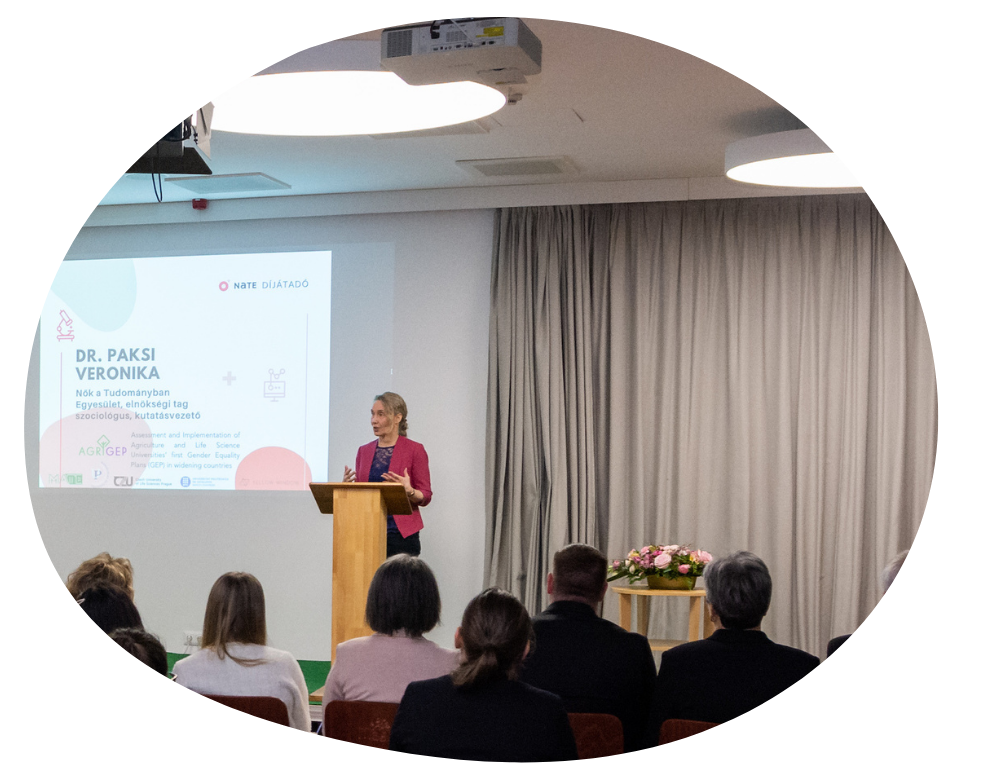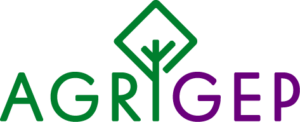Mit érdemes tudni a projektről?
A Nők a Tudományban Egyesület (NaTE) a Magyar Agrár- és Élettudományi Egyetem (MATE) koordinálásával az újonnan indult Horizont Európa projekt AGRIGEP projektjének partnere.
AGRIGEP – 101094158 (2023-2025): Assessment and Implementation of Agriculture and Life Science Universities’ first Gender Equality Plans in widening countries
Konzorciumvezető:
Magyar Agrár-és Élettudományi Egyetem (MATE)
Partnerek:
- Czech University of Life Sciences (Česká zemědělská univerzita v Praze) (CZU)
- University of Primorska (Univerza na Primorskem – Universita del Litorale) (UP)
- Universitat Politecnica de Catalunya BarcelonaTech (Universitat Politècnica de Catalunya • BarcelonaTech) (UPC)
- Yellow Window (YW)
- Association of Hungarian Women in Science (Nők a Tudományban Egyesület) (NaTE)
Résztvevők a NaTE részéről:
Paksi Veronika (projektvezető), Társadalomtudományi Kutatóközpont
Tardos Katalin (résztvevő kutató), Társadalomtudományi Kutatóközpont
A projektről
A nemek közötti egyenlőtlenség jelentősen korlátozza a kutatási és oktatási intézmények képességeit és kapacitásait a Kutatás-Fejlesztés (K+F) területén. Az EU a K+F-intézményekben kötelezően kidolgozandó nemek közötti egyenlőségi tervek (GEP) bevezetésével célozza meg a problémát, azonban az eltérő képességek, kapacitások és szakértelem akadályozza a hatékony végrehajtást. A természettudományos, technológiai, mérnöki és matematikai (STEM) területeken a nemek közötti egyenlőtlenségekkel kapcsolatos problémák fokozottan jelentkezhetnek, amelyre már léteznek konkrét cselekvési tervek. Ugyanakkor a STEM területek sem homogének, a mezőgazdaság és az élettudományok területén az intézmények nagyon hasonló problémákkal szembesülnek, azonban hiányoznak az ágazatspecifikus intézkedések, a probléma megoldását célzó tervek. Továbbá a mezőgazdaság tudományterületén számos egyetemi hallgató érkezik olyan fejlődő országokból az EU kutatási-oktatási intézményeibe, ahol kifejezetten nagy az ágazatspecifikus egyenlőtlenség a nemek között.
Ezért az AGRIGEP projekt a következő célokat tűzte ki:
- A nemek közötti egyenlőségi terveiket (GEP) első alkalommal végrehajtó partnerintézmények képességeinek felmérése, valamint az erősségek és gyengeségek, kockázatok és lehetőségek azonosítása (az egyetemek GEP-hez kapcsolódó értékelése)
- A képességek növelése kapacitásépítéssel, valamint a GEP-ek hatékony végrehajtásához szükséges reformok és strukturális változások előmozdítása (képzési anyagok az intézmények oktatói, kutatói, alkalmazottai és hallgatói számára).
- Ágazatspecifikus (mezőgazdaság és élettudomány) értékelés elvégzése, a GEP-stratégiák felülvizsgálata és aktualizálása az ágazati igények alapján, valamint az ágazatspecifikus releváns intézkedések meghatározása (kutatási partnerintézményekre szabott GEP-ek).
- A szakemberek következő generációja számára releváns ismeretek nyújtása a mezőgazdasággal és az élettudományokkal kapcsolatos GEP-kérdésekről, különös tekintettel a nemzetközi hallgatókra (kutatási partnerintézmények tanterveihez igazított képzési anyagok)
- Hosszú távú intézményi reformok, az intézményi GEP-ek hosszú távú végrehajtásának és hatásának biztosítása a projekt élettartamán túl, strukturális változások révén (ágazati GEP tudásmegosztó hálózat)
- A nemek közötti egyenlőség témája bekerüljön a regionális politikai szervezetek oktatási rendszerébe és a diákok szakmai képzésébe; növelje a kutatási partnerintézmények inkluzivitását, hírnevét, vonzerejét és kutatási kiválóságát; elősegítse az intézményi átalakulást, elősegítse a nemek esélyegyenlőségét az Európai Kutatási Térségen belül.
Hírek az AGRIGEP projektről
Mi történt eddig a projektben? Ismerd meg a konzorcium tagjait! Közelgő események az AGRIGEP projekt keretein belül.
Minden infót megtudhatsz hírleveleinkből.
Nők a Tudományban Kiválósági Díj Magyarországon

- 2024-ben a Nők a Tudományban Kiválósági Díjat a nőnaphoz kötődően tizenegyedik alkalommal adhattuk át, a szakterületükön legkiválóbb kutatónők munkásságát az UNESCO Magyar Nemzeti Bizottsága védnökségével díjaztuk..
- A Kíválósági Díj idei díjazottai a daganatos sejteket és a klímaváltozást kutatják – a jövő generációját inspiráló példaképek.
- Nők a Tudományban Kiválósági Díjjal ismertük el Dr. Lengyel Edina és Dr. Munkácsy Gyöngyi munkásságát, kiemelkedő tudományos teljesítményük, valamint a jövő kutatói generációját érintő mentorálási tevékenységük elismeréseként. A kutatói tevékenység támogatásáért munkatársai jelölése alapján Kiválósági Díjat adományoztunk Kohajda Mónikának, a Szegedi Tudományegyetem Bőrgyógyászati és Allergológiai Klinika laborasszisztensének.
- Az eseményen bemutattuk az AGRIGEP projektet Paksi Veronika tolmácsolásában, aki a NaTE elnökségi tagja és az AGRIGEP csapatát is erősíti.
Előadás az AGRIGEP-ről
A HUN-REN TTK Esélyegyenlőségi Bizottságának szervezésében 2024. május 23-án tartott előadást Paksi Veronika elnökségi tagunk a nők tudományos szakmai előmenetelének témájában, amely a NaTE AGRIGEP projektjének gondolatiságába illeszkedik.
Az előadás különös figyelmet szentelt a nemek közötti egyenlőség fontosságának kiemelve ezt a tudományos pályán, illetve a nemek közötti egyenlőségi tervek (GEP) kidolgozását és végrehajtását olyan kutatási- és oktatási intézményekben, mint a HUN-REN TTK. Az előadást kerekasztal-beszélgetés követett a HUN-REN TTK-ban vezető pozíciót betöltő kutatónőkkel.
Miért fontos a nők tudományos előmenetele?
Az egyenlő esélyek biztosítása növeli a tudományos kutatások sokszínűségét és minőségét, a GEP-ek bevezetése pedig egy komoly szervezetfejlesztés, amit a felső vezetésnek mérlegelnie javasolt. A nők jelenléte a tudományos életben olyan perspektívákat hoz be, amely gazdagítja a kutatásokat, és innovatív megoldásokat eredményezhetnek. Emellett a női kutatók szerepmodellként szolgálhatnak a fiatalabb generációk számára, bátorítva őket a tudományos pálya választására. A NaTE az AGRIGEP projekt részeként is elkötelezett amellett, hogy elősegítse a nők tudományos karrierjét.
Ha szeretnél értesülni a projekt tevékenységeiről, eredményeiről és eseményeiről, iratkozz fel hírlevelünkre! Légy naprakész!
About the project
Association of Hungarian Women in Science (NaTE) is a partner in the newly launched Horizon Europe project AGRIGEP under the coordination of the Hungarian University of Agriculture and Life Sciences (MATE).
AGRIGEP – 101094158 (2023-2025): Assessment and Implementation of Agriculture and Life Science Universities’ first Gender Equality Plans in widening countries
Head of consortium:
Hungarian University of Agriculture and Life Sciences (MATE)
Partners:
- Czech University of Life Sciences (Česká zemědělská univerzita v Praze) (CZU)
- University of Primorska (Univerza na Primorskem – Universita del Litorale) (UP)
- Universitat Politecnica de Catalunya BarcelonaTech (Universitat Politècnica de Catalunya • BarcelonaTech) (UPC)
- Yellow Window (YW)
- Association of Hungarian Women in Science (Nők a Tudományban Egyesület) (NaTE)
Participants on behalf of NaTE:
Paksi Veronika (project leader), Institute for Sociology, Centre for Social Sciences
Tardos Katalin (participant researcher), Institute for Sociology, Centre for Social Sciences)
The project
Gender inequality is a major barrier in the R&I area that limit the capabilities and capacities of research performing institutions (RPOs). Across the EU, the development of Gender Equality Plans (GEP) intends to address the problems at RPOs; however, the variability in capability, capacity, and expertise hinder the efficient implementation of the institutional GEPs. GE issues in the Science, Technology, Engineering and Mathematics (STEM) fields are well known and specific action plans have been developed. Meanwhile, STEM fields are also not homogenous, and within STEM, agriculture and life-science focused RPOs face very similar problems, but they lack sector-specific measures and mitigation plans. Furthermore, in the field of agriculture, many university students come to EU research and education institutions from developing countries where there is a marked sector-specific gender imbalance.
Therefore, the AGRIGEP project aims to:
- Assess the capabilities of the partner institutions implementing their Gender Equality Plans (GEPs) for the first time and identify strengths and weaknesses, risks and possibilities (GEP-related assessment of universities)
- Increase capabilities through capacity building, and promote reforms and structural changes for the efficient implementation of GEPs (training materials for institutions’ staff, employees, and students).
- Perform a sector-specific assessment, revise and update GEP strategies based on the sectorial needs, and determine sector-specific relevant measures (tailor-made GEPs to each research partner organisation).
- Provide relevant knowledge on GEP issues in relation to agriculture and life science to the next generation of professionals, with a specific focus on international students (training materials implemented to research partner organisation curricula).
- Achieve long-term institutional reforms by ensuring the long-term implementation and impact of institutional GEPs beyond the project lifetime through structural changes (sectoral GEP knowledge sharing network).
- Establish the inclusion of GE issues within the RPOs’ educational system and professional training of students;, enhance the inclusiveness, reputation, attractiveness, and research excellence of widening country RPOs; promote the transformation of institutions and advance GE within the ERA as well.
AGRIGEP project news
What has happened so far in the project? Meet the consortium members! Upcoming events within the AGRIGEP project.
You can find all the information in our newsletters.
Women in Science Award of Excellence in Hungary

- In 2024, the Women in Science Award of Excellence was presented for the eleventh time on the occasion of the International Women’s Day, to honour the most outstanding women researchers in their field, under the auspices of the Hungarian National Commission for UNESCO.
- This year’s winners of the Award of Excellence are researching cancer cells and climate change – are role models who are inspiring the next generation.
- The Women in Science Award of Excellence was presented to Edina Lengyel, PhD and Gyöngyi Munkácsy, PhD in recognition of their outstanding scientific achievements and their mentoring of the next generation of researchers. Based on the nominations of her colleagues, we awarded the Award of Excellence to Mónika Kohajda, a laboratory assistant of the Department of Dermatology and Allergology, at the University of Szeged, for her support of the researchers’ activities.
- The AGRIGEP project was introduced by Veronika Paksi, who is board member of the Association of Hungarian Women in Science and member of the AGRIGEP team.
Presentation about the AGRIGEP
On 23 May 2024, our board member Veronika Paksi gave a lecture on the topic of women’s career advancement in science, organised by the Committee for Equal Opportunities of the HUN-REN TTK, which fits into the idea of the NaTE AGRIGEP project.
The presentation focused in particular on the importance of gender equality, especially in the academic field, and highlighted the development and implementation of Gender Equality Plans (GEPs) in research and educational institutions such as HUN-REN TTK. The presentation was followed by a round table discussion with senior women researchers at HUN-REN TTK.
Why is it important women’s academic career advancement?
Providing a more equitable environment will increase the diversity and quality of scientific research, and the introduction of GEPs is a major organisational development that senior management should consider. The presence of women in science brings perspectives which enrich the research and can result in innovative solutions. In addition, women researchers can serve as a role model for younger generations, by encouraging them to choose a career in science. NaTE is committed to promoting women’s careers in science even as part of the AGRIGEP project.

